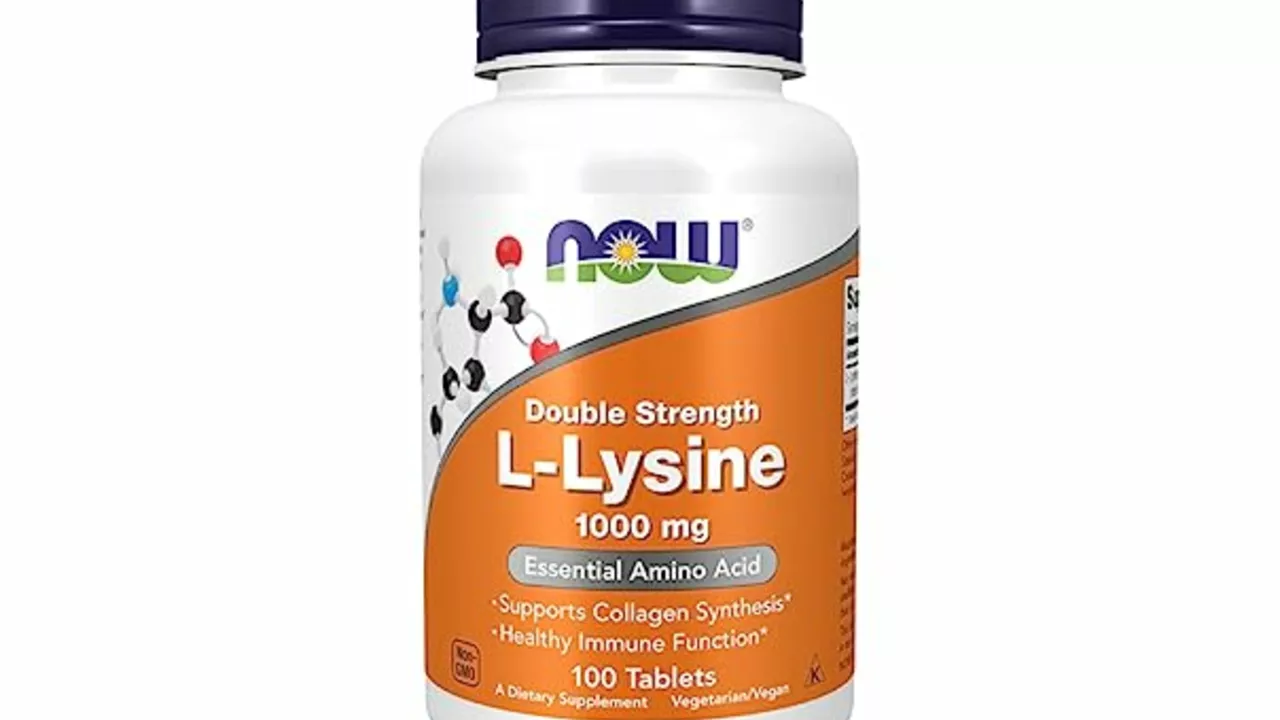Boost Your Cognitive Function with the Power of Gamma-aminobutyric Acid
Understanding Gamma-aminobutyric Acid (GABA)
In the realm of cognitive function, Gamma-aminobutyric Acid, or GABA as it's commonly known, is a star player. It is one of the most prevalent inhibitory neurotransmitters in our nervous system. This means it plays a key role in calming our nervous system when we're feeling stressed or anxious. GABA is essentially the brain's natural calming agent. When there's an adequate amount in our bodies, we feel relaxed and at ease. When levels drop, we may experience anxiety, insomnia, and various other health issues.
The Role of GABA in Cognitive Function
GABA is not just about relaxation, it's also vital for our cognitive function. It helps our brain to function at its optimal level by maintaining the balance between excitation and inhibition. Without the inhibitory function of GABA, our neurons would fire too often and too randomly, leading to confusion and possible brain dysfunction. GABA ensures that our brain is working efficiently and effectively, supporting memory, attention, and overall cognitive performance.
Signs of GABA Deficiency
How do you know if your GABA levels are low? There are several signs that may indicate a deficiency in this powerful neurotransmitter. These include feelings of anxiety, insomnia, chronic pain, and even depression. A deficiency in GABA can also manifest as brain fog, where you have difficulty focusing, thinking clearly, or remembering things. If you experience any of these symptoms, it might be worth looking into ways to boost your GABA levels.
The Power of GABA Supplements
One way to increase your GABA levels is through supplementation. GABA supplements are widely available and can be a simple and effective way to boost your GABA levels. They work by directly increasing the amount of GABA in your brain, which can help to alleviate symptoms of GABA deficiency such as anxiety and insomnia. However, it's always important to consult with a healthcare professional before starting any new supplement regimen.
GABA-Rich Foods for Brain Health
Another way to boost your GABA levels is through your diet. Certain foods are rich in GABA or promote its production in the body. These include green tea, whole grains, nuts, seeds, and fermented foods like yogurt and kimchi. Incorporating these foods into your daily diet can help to naturally increase your GABA levels and improve your cognitive function.
The Connection Between GABA and Sleep
Getting a good night's sleep is crucial for cognitive function, and GABA plays a key role in this. It helps to regulate our sleep cycles and promotes deep, restful sleep. When our GABA levels are healthy, we're more likely to fall asleep easily, stay asleep throughout the night, and wake up feeling refreshed. If you're having trouble sleeping, boosting your GABA levels might be the solution.
Exercise and GABA Levels
Exercise is not just good for your physical health, it's also beneficial for your brain. Regular physical activity has been shown to increase GABA levels in the brain, which can help to improve mood, reduce anxiety, and enhance cognitive function. Whether it's a brisk walk, a yoga class, or a high-intensity workout, getting your body moving can boost your brain health.
Mindfulness, Meditation, and GABA
Did you know that practices like mindfulness and meditation can also boost your GABA levels? Studies have shown that these practices can significantly increase the amount of GABA in your brain, leading to improved mood, reduced stress, and better cognitive function. So, take some time each day to quiet your mind and focus on the present moment - your brain will thank you.
The Final Word on GABA and Cognitive Function
In conclusion, GABA is a powerful neurotransmitter that plays a crucial role in our cognitive function. Whether through diet, supplements, exercise, or mindfulness practices, there are many ways we can boost our GABA levels and in turn, enhance our brain health. Remember, a healthy brain is key to a healthy life. So, take care of your brain, and it will take care of you.







9 Comments
Joshua Ardoin
June 27, 2023 at 23:39
Wow, this post really sheds some light on GABA 🌟! I love how it breaks down the science in a way that feels like a chat over coffee. Adding more green tea and fermented goodies sounds like a tasty plan, and the idea that a simple walk can boost brain chill vibes is awesome. Thanks for the friendly reminder to treat our brains with the same care we give our bodies. Keep spreading the good vibes! 😊
Glenn Gould
June 28, 2023 at 13:00
Totally on board with that, bro! GABA is the real MVP and we gotta feed it right. I’m gonna start munchin on nuts and yogurt tmrw, cuz why not? And hey, a quick jog before bed can totally level up that sleep game. Let’s get those brain juices flowin’! 💪
Poonam Sharma
June 29, 2023 at 02:53
Listen up, folks! While you all are sipping on green tea, remember that the ancient Ayurvedic traditions of India have been harnessing GABA-rich foods for centuries. The fermentation of curd, the power of ashwagandha, and the meticulous balance of spices are not just trendy buzzwords-they’re scientific gold. If you think a Western supplement can replace this heritage, you’re missing the point. Embrace the full spectrum, or you’ll stay stuck in a shallow understanding of neurochemistry.
Meigan Chiu
June 29, 2023 at 16:46
I must disagree with the oversimplification that "any walk boosts GABA." While aerobic exercise does have some effect on neurotransmitters, the magnitude varies widely among individuals, and other factors-diet, sleep quality, and stress levels-play equally critical roles. Moreover, stating that GABA supplements work universally ignores the poor blood‑brain barrier permeability of many oral formulations. In short, the reality is nuanced, not a blanket statement.
Patricia Hicks
June 30, 2023 at 06:40
Reading through this article feels like taking a soothing stroll through a garden of neuroscience, where each section blossoms with practical advice and hopeful encouragement. First, the clear explanation of GABA as the brain's natural calming agent sets a solid foundation, making even those unfamiliar with neurochemistry feel welcomed. Then, the connection between GABA and cognitive performance reminds us that a relaxed mind is a sharp mind, which is an empowering reminder for students and professionals alike. The signs of deficiency are listed with empathy, acknowledging the frustration of living with anxiety, insomnia, or that dreaded brain fog. When it comes to supplementation, the article wisely advises consulting healthcare professionals, striking a balance between enthusiasm and caution. The inclusion of GABA‑rich foods-green tea, whole grains, nuts, seeds, and fermented delights-provides accessible options for anyone looking to naturally enhance their neurotransmitter balance. I especially appreciate the emphasis on diet because it empowers readers to make immediate, delicious changes without waiting for a pharmacy visit. The segment on sleep highlights a critical, often overlooked link: without restorative sleep, even optimal GABA levels may fall short in supporting cognition. By tying in exercise, the piece reinforces that movement is not just for the muscles; it’s a catalyst for brain chemistry, uplifting mood and focus. The mindfulness and meditation portion adds a contemplative layer, noting that mental practices can physically elevate GABA, bridging the gap between inner peace and biochemical health. Throughout, the conversational tone feels inclusive, inviting readers from diverse backgrounds to join the journey toward better brain health. The concluding reminder that a healthy brain is the cornerstone of a healthy life resonates deeply, serving as a motivational call to action. Overall, this article is a comprehensive, compassionate guide that turns complex science into everyday empowerment, and I’m thrilled to share it with my community!
Quiana Huff
June 30, 2023 at 20:33
Great insights! Adding GABA‑boosting foods is like upgrading your brain’s firmware-simple, effective, and delicious. Remember to stay consistent; the neurochemical benefits build over time. Let’s keep the momentum going! 😎
William Nonnemacher
July 1, 2023 at 10:26
Looks like a lot of hype.
Alex Ramos
July 2, 2023 at 00:20
While the article presents a generally accurate overview of GABA’s role, it would benefit from referencing peer‑reviewed studies, especially regarding supplement bioavailability, to substantiate the claims made.
Mita Son
July 2, 2023 at 14:13
Honestly, I’ve read tons about GABA and it’s not just about adding tea or yoga. The body’s own synthesis pathway, involving glutamate decarboxylase, is critical, and many factors can inhibit that enzyme. So, while this guide is friendly, it oversimplifies a complex neurochemical landscape.